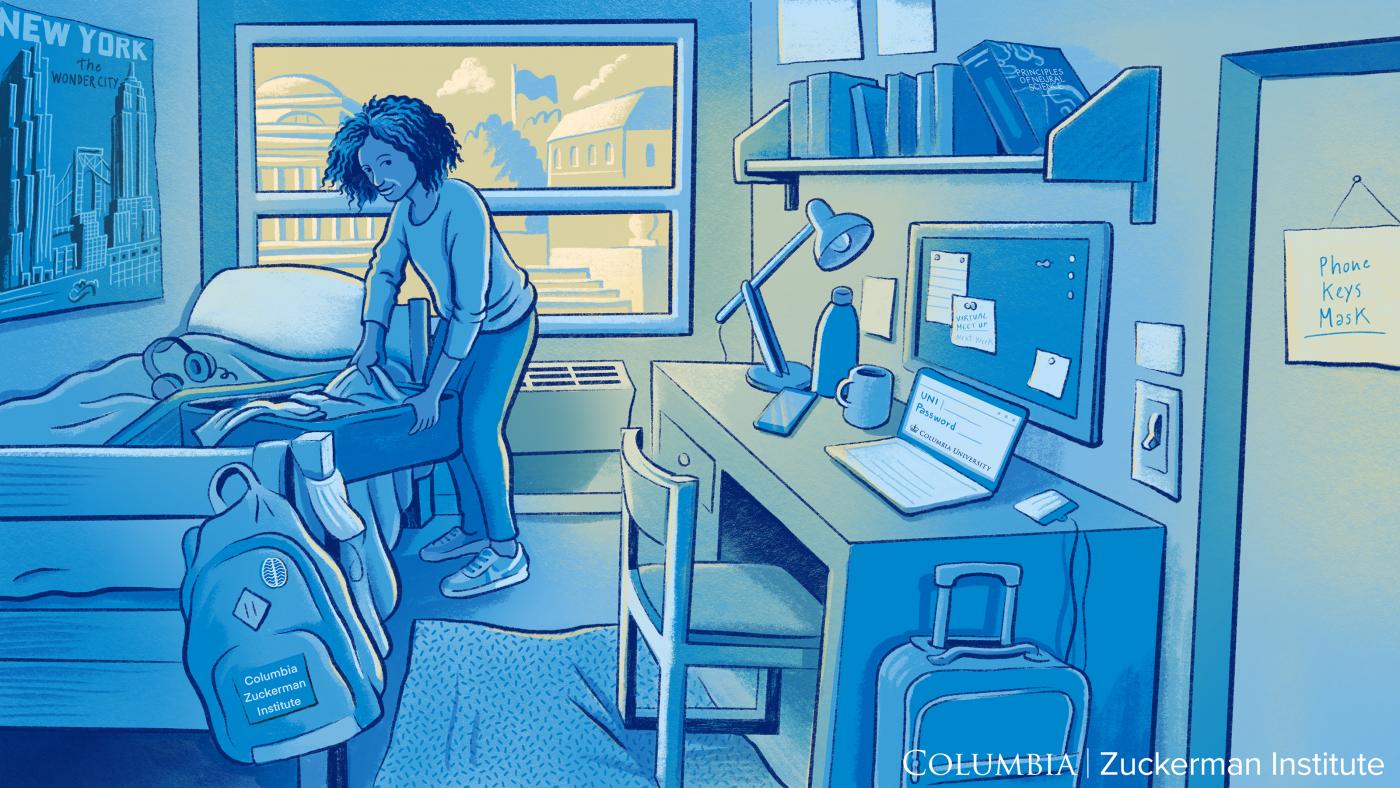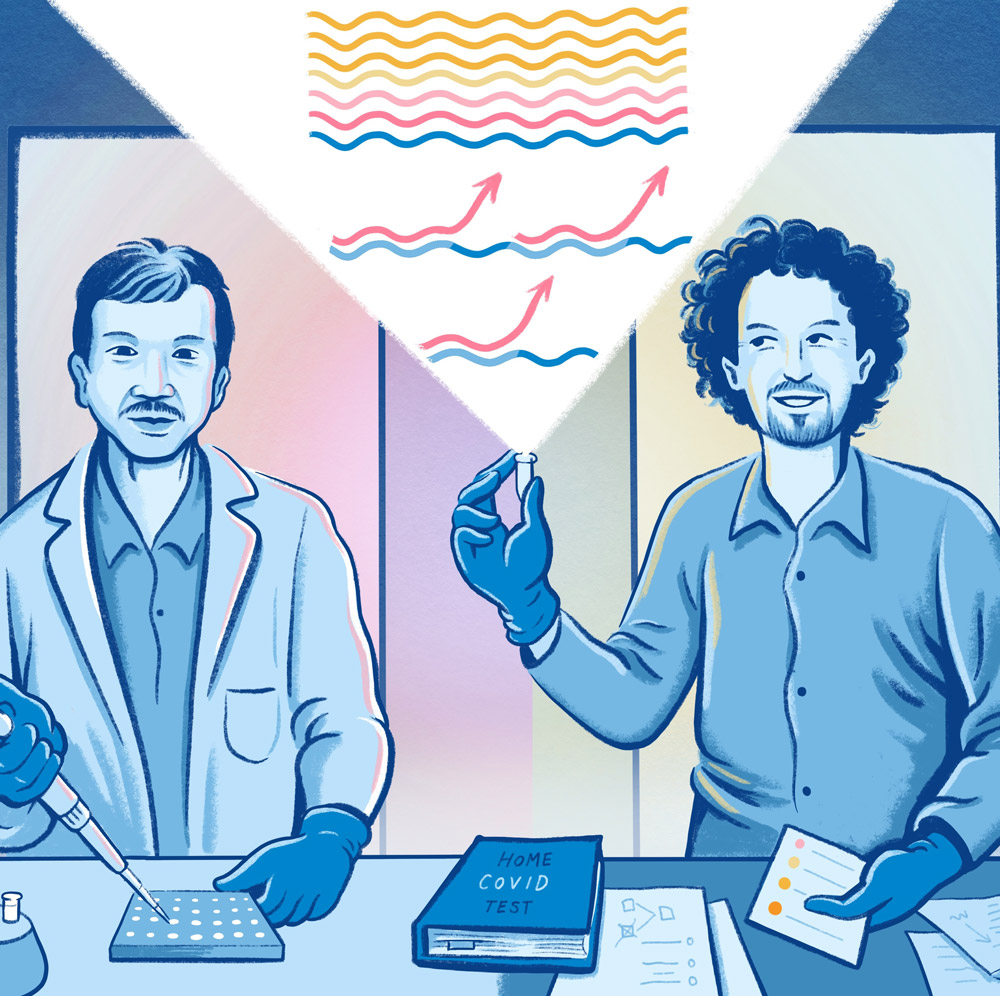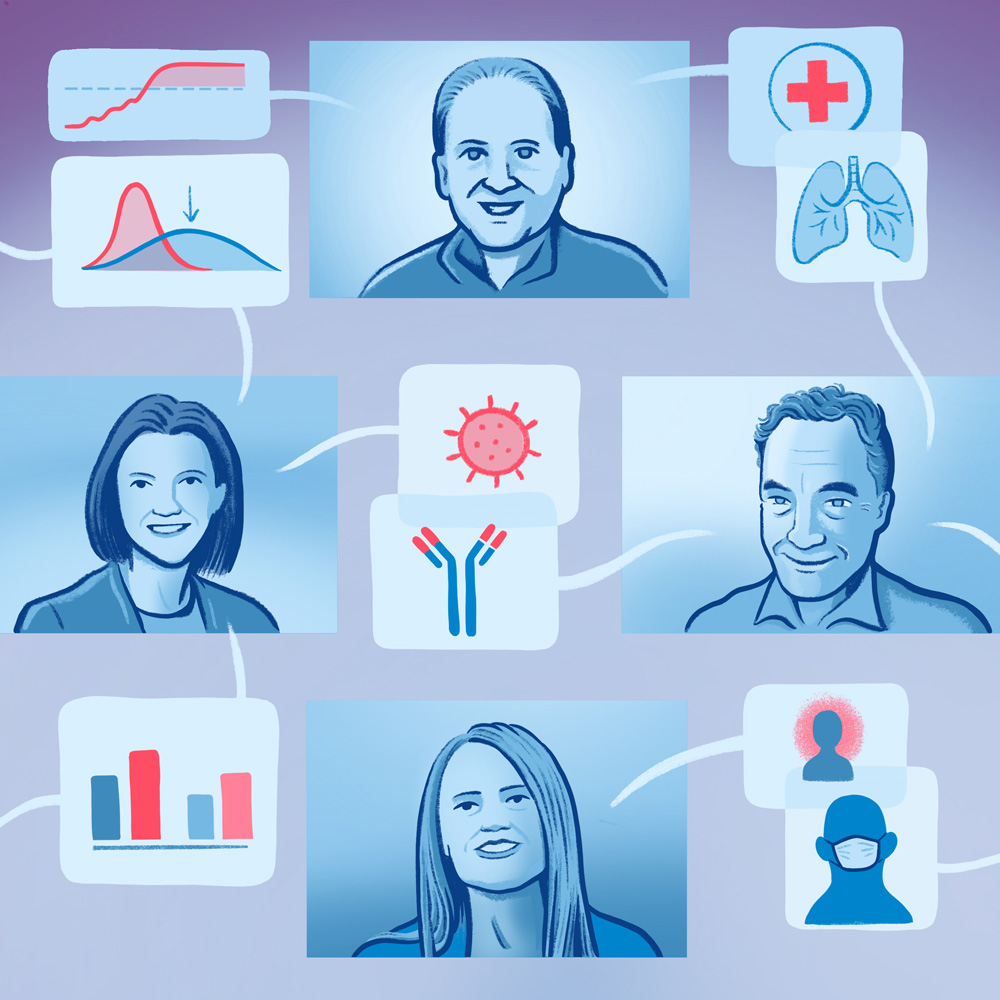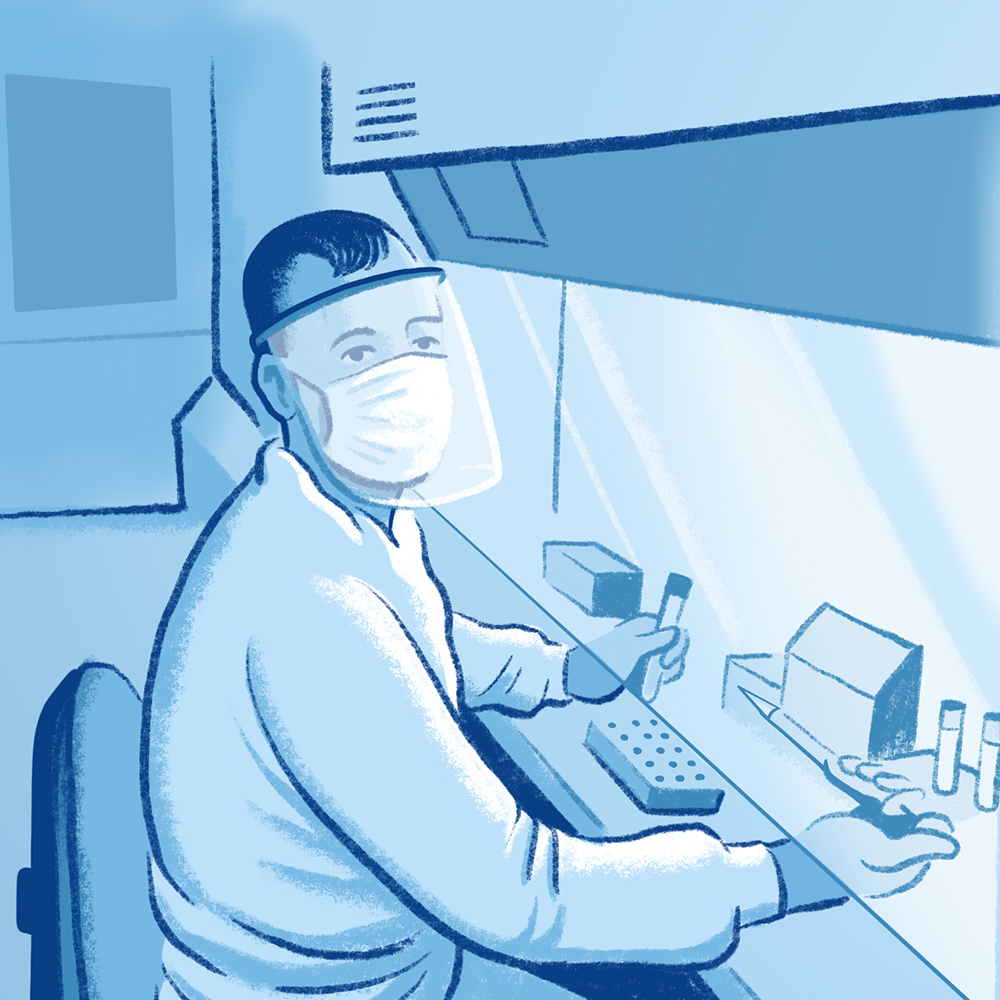KATHLEEN I’m Kathleen Durkin of Columbia University’s Zuckerman Institute.
DEVIN And I’m Devin Powell of the Zuckerman Institute.
KATHLEEN Welcome to Lab in the Time of Coronavirus, a podcast that follows the lives of brain scientists during the ongoing pandemic.
DEVIN Today we’re bringing you our back-to-school episode. That means it’s time to sharpen your pencils, get out your three-ring binders and, these days, make sure Zoom is installed correctly. Today we’re going to meet some graduate students preparing to start their neuroscience careers. And we’re going to talk to the professors figuring out how to train this next generation of neuroscientists during these difficult times.
KATHLEEN So why would anyone decide to go to grad school in the country’s densest city in the middle of a pandemic? It starts, of course, with a love of science. And for at least one incoming grad student, that scientific passion has been shaped by the pandemic itself.
BRIANA I’m Briana McRae, and I recently graduated this past May from MIT with a major in brain and cognitive sciences and a minor in computer science. For my PhD in neurobiology and behavior at Columbia, I’m interested primarily in systems neuroscience, because that’s where my background lies. But I’m also really excited about exploring other subfields, mainly human cognition, which I think is the first thing I want to explore. This is actually a sentiment that I think came out of quarantine, just really reflecting on the human experience. We’re all in different situations, I know the pandemic affects different people differently, but to some degree we are experiencing similar things in terms of feelings of isolation or missing people that we can’t see or missing milestones, like graduation or prom or other things like that. And so definitely in reflecting about that aspect of the last few months I’ve fallen back to what first made me interested in neuroscience, which is studying human behavior and the things that we take for granted every day, like our emotions, or our ability to shift our attention, things like that.
DEVIN For jazz musician and incoming grad student Rachel Frazer, the Zuckerman Institute seemed like the perfect place to explore her two passions: neuroscience and music. She initially learned about the institute by reading an article written by principal investigator Michael Shadlen, MD, PhD.
RACHEL I started being interested in music’s ability to heal people when I was a junior in high school. I did a research project on music therapy. And I became more interested in learning about the neuroscience behind it, so that I could prove the significance of it to a scientific community, so that there can be more resources for music therapists and for this very real healing process that goes on. And then I was applying to grad school, and I looked up music and the brain and then Columbia, and a paper from Michael Shadlen was one of the first things that came up. So I looked up that, and then I found the Jazz Artist-in-Residency program. At my interview, I was talking to Michael Shadlen, and I was telling him about my interest in the brain and music and healing, and he was like, “That sounds really cool but it’s not necessarily clinically proven.” And I was like, “Not yet.” So hopefully I can do something there.
KATHLEEN After her interview, Rachel got waitlisted. Getting off that waitlist was a particularly joyous moment in these difficult times.
RACHEL Amidst everything and all of the insanity I was just so happy. I was just so, oh my gosh, overjoyed and just immediately was like I’m accepting, I’m accepting. There was no thought.
DEVIN So it seems like the students are in. Figuring out how to train them is the job of faculty, including Darcy Kelly, PhD and Wes Grueber, PhD, co-directors of the Columbia University Doctoral Program in Neurobiology and Behavior. We sat down with them to ask what an ordinary year usually looks like for first year students and how COVID has changed that.
WES They would arrive in early August to the campus and get settled with their roommates. They would start around mid-August with a boot camp, where they’d get together and learn about some of the techniques and be able to interact with investigators, interact with each other, see a little bit of New York. After the boot camp they would begin courses, and they have three short internships or rotations in different labs of their choosing. They’re learning about the kinds of techniques that the lab uses. They’re getting instruction from labmates about these techniques. Those research rotations are a really, really important part of the first year, so that at the end of the first year they can choose a lab to join.
KATHLEEN Move in, class bonding, coursework and research rotations: It’s a lot to coordinate. All of this was made extra-complicated by COVID.
WES It’s a very dynamic environment in which we’re trying to make very consequential decisions for our incoming students. We had just recruited them to the neuro program, and they had just made their decisions around the time of the pandemic. New York was of course the epicenter at that point. We had many discussions with the incoming students about what New York looked like, whether they were going to be safe coming here, what the plans for Columbia were for dealing with the pandemic and New York City broadly for dealing with the pandemic.
DEVIN The evolving situation requires an agile approach, Darcy Kelley told us.
DARCY It’s taken a lot of work, and it’s been distressing at times. The uncertainty has been difficult. What we’ve learned is that you have to be flexible, because in fact nobody can know what’s going to happen. So we’ve set everything up so that if circumstances change we can pivot.
KATHLEEN To minimize risk, Darcy and Wes made the decision to move all classes online, to Zoom, and to do the same for a bootcamp that traditionally takes place in person. For Darcy, this has felt like figuring out how to communicate with people living on Mars.
DARCY I’ve been thinking of this whole experience as something like what we might go through if we had a colony on Mars. So if we had a colony on Mars and we were going to offer good education for everybody and bond to our Mars colony as Earthlings and so forth and so on, what we would have is Zoom.
DEVIN The program already had some experience doing Zoom classes at the end of the previous academic year, so that’s helped. More difficult has been figuring out how to do rotations: the stints students usually spend doing research in different laboratories.
What we’ve learned is that you have to be flexible, because in fact nobody can know what’s going to happen.
DARCY The biggest challenge is the in-person experience in the lab. These are your students. You worry about their health and their welfare. So what we’ve done is, and I’ve been talking to the incoming students about this, I asked them who they’re interested in, and the labs have very generously offered to host them at their weekly lab meetings. Everybody has Zoom weekly lab meetings, so that they can get a feel for what the lab is about.
WES They’ll be starting rotations in the fall. They’ll be starting courses online at the same time. And our point is to try to make the rotation process as normal as possible for them.
KATHLEEN In planning this experience, Darcy and Wes had to consider not only the safety of their students but also immigration difficulties.
DARCY Columbia is, of course, this is true for the United States as a whole, a beacon for graduate education across the world. And we have students coming in from countries where the consulates have been closed.
WES For a while we feared that some of our incoming students were not going to be able to come into the country.
DEVIN Let’s meet Francisco Sacadura, who is an incoming student from Portugal, and hear his story.
FRANCISCO I was in London when the pandemic started. It was about the same time as things were closing that we had to make a decision on grad school, I think it was the 14th of April. The situation was not great in New York at the time, but I’ve been working on motor control, and on the cerebellum, and I know that Zuckerman specifically has a very strong department in motor control. So I already knew I was to come to Columbia. Right now the three labs I’m thinking of rotating with are Mark Churchland, Rui Costa and Nate Sawtell. In the beginning of June I came to Portugal. Until almost the end of July, all the embassies were closed, so the situation was pretty uncertain whether we were going to come until the spring. The start was very confusing and uncertain, but I got a visa this week. Now I’m happy because New York is doing pretty great with the pandemic.
KATHLEEN Graduate school isn’t just classes and research: The social experience also has a profound effect on shaping the careers of scientists. That’s where the second-year students have stepped in. They’re worried about the lack of in-person contact these days. So they’ve gotten creative. Olivia Lofaro, who started graduate school last year, describes how she and her classmates have worked to help glue together the incoming cohort of students.
OLIVIA We’ve been trying to basically open the lines of communication as much as possible. We started a Slack group message with both of our cohorts together. We have planned a lot of Zoom events. We also paired every member of the incoming cohort up with a buddy in the second year cohort. Peer support is always really important. Historically, scientists have this reputation as being like reclusive people who are just locked away in a lab, and that’s not good for your mental health or for your ingenuity and creativity and things like that. So I know neuroscience is a competitive field but I think it’s really, really important to feel like you have people rooting for you and in your corner. That’s made all of us better scientists.
KATHLEEN Thanks for listening to Lab in the Time of Coronavirus. Take a look at the show notes for links to all of the things we discussed. You can find all of our episodes at zuckermaninstitute.columbia.edu or on iTunes. Take a moment to rate and review us on iTunes. That makes it easier for other people to find us.
DEVIN Special thanks to Rui Costa, Kelley Remole, everyone who sat down with us for this episode and the entire Zuckerman team. The music was provided, as usual, by Miguel Zenón, Jazz Artist-in-Residence at the Zuckerman Institute. If you have any thoughts or any questions, you can find us on Twitter and Instagram @ZuckermanBrain. But before we go, Kathleen I think you had one last question for our researchers today.
KATHLEEN What is the first thing you plan to do post-pandemic? Francisco wants to meet his fellow students in person.
FRANCISCO I think the first thing would be maybe to have a social with the first-year and second-year students.
KATHLEEN Rachel, of course, wants to go to a jazz club.
RACHEL New York is such a great place for that, and it’s really sad that all the music has been put on hold.
KATHLEEN Olivia misses martial arts.
OLIVIA That’s so much close contact with strangers, that it’s going to be the absolute last thing to open up, but I do miss it a lot.
KATHLEEN Briana longs to dance.
BRIANA I think the first thing that I would do is go dance.
KATHLEEN Darcy misses her family.
DARCY I am going to spend time with my children and grandchildren.
KATHLEEN And Wes wants to properly celebrate some of his past and present lab members.
WES Labs right now are at 50 percent capacity, and during the pandemic several people left the lab and several people joined. So we need to have a 100 percent capacity lab party to fix this problem.



